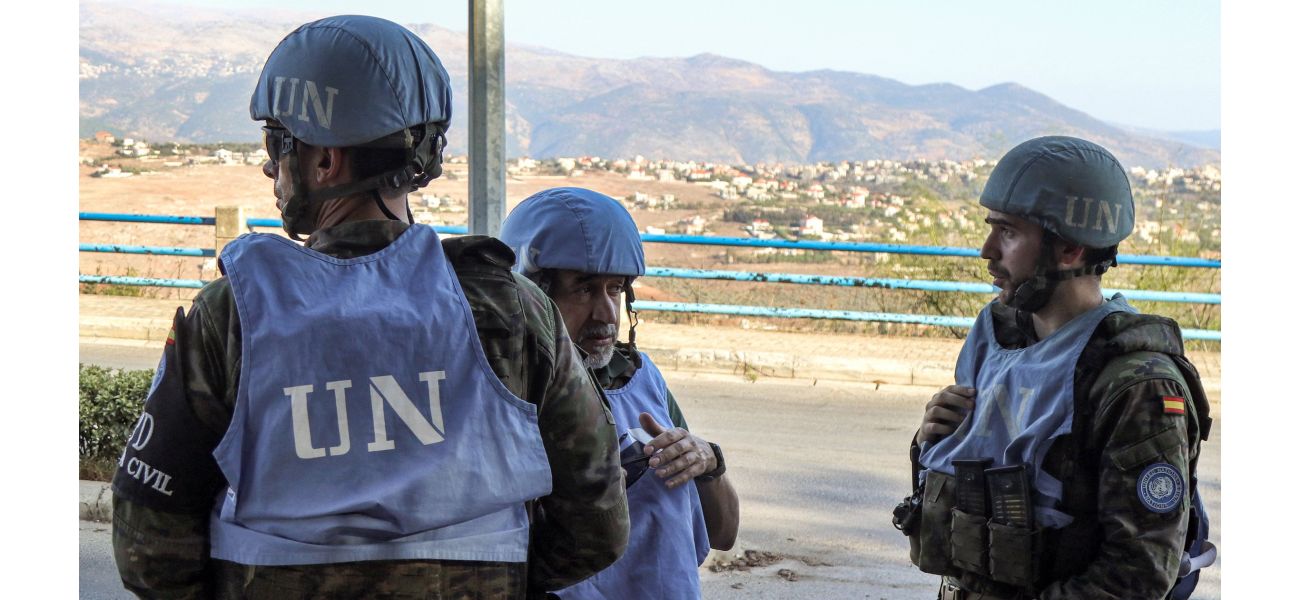What is the purpose of UN peacekeepers in Lebanon?
UN peacekeepers caught in crossfire of Israeli attacks in southern Lebanon.
October 14th 2024.

In the southern region of Lebanon, the Spanish peacekeepers of the United Nations Interim Force have been working closely with the Lebanese Military Police. They coordinate their patrols in order to maintain peace and security in the area. However, their job is not an easy one, as they face a constant threat from Israel's military forces.
Tanks, drones, artillery, and thousands of soldiers from Israel are a common sight for these peacekeepers. They have to constantly be on guard and ready to respond to any potential attacks. Unfortunately, on Saturday one of the peacekeepers was wounded by gunfire near their watchtower in the city of Naquora. This was confirmed by the UN Interim Force in Lebanon, who stated that this was a deliberate and serious violation of international humanitarian law.
The Israeli Prime Minister, Benjamin Netanyahu, has accused the peacekeepers of acting as a "human shield" for Hezbollah. He has even ordered them to vacate their posts, but the peacekeepers have rejected this demand. Despite the constant threat and accusations, these brave men and women continue to hold their ground and fulfill their duty. In fact, they even hold their flag high as they observe Israeli attempts to destroy tunnels built by Hezbollah.
The nations that contribute to UNIFIL have condemned Israel's continuous shelling on the 10,541 peacekeepers stationed between the Litani River and the UN-recognized boundary known as the Blue Line. Despite the ongoing attacks, these peacekeepers remain steadfast in their mission. But why are they still in Lebanon in 2024?
The first troops were stationed in Lebanon in 1978, after Israel's invasion. Since then, they have been present in the southern region for over 46 years. The UN Interim Force in Lebanon, also known as UNIFIL, is made up of 10,541 peacekeepers from around 50 countries. Most of these peacekeepers are troops from countries such as Indonesia, India, Ghana, Nepal, and Ireland, just to name a few.
Their area of operation covers 410 square miles, marked by the Litani River in the north and the Blue Line in the south. Their initial role was to oversee the withdrawal of Israeli soldiers, restore peace and security, and assist Lebanon's government in regaining authority in the south. However, their mandate was expanded in 2006 after the 34-day war between Israel and Hezbollah. They were now tasked with keeping weapons and fighters out of the south.
Despite the dangers they face, these peacekeepers continue to fulfill their duties. However, their role has evolved as they now find themselves in the midst of escalating cross-border strikes. Hezbollah has been firing guided rockets and artillery shells at Israeli positions in the occupied Shebaa Farms since October 2023. The peacekeepers now have to regularly patrol a battlefront and report any violations to the UN Security Council.
But their job is not just about patrolling and reporting. They also work to de-escalate tensions by conveying messages between the Lebanese and Israeli militaries. Unfortunately, the formal mediation mechanism has been suspended. Currently, the UNIFIL is facing a new challenge after the Israeli Defence Forces destroyed the main gate and entered a United Nations base in southern Lebanon on Sunday morning.
According to the UNIFIL, rounds were fired nearby, causing 15 peacekeepers to suffer skin irritations and gastrointestinal reactions. However, the IDF has offered a different version of events, stating that they had encroached on the base to evacuate wounded soldiers. This incident has caused concern and condemnation from the European Union, who rejects Israeli allegations that the UN is keeping peacekeepers in Lebanon to prevent an attack on Hezbollah.
Despite the ongoing challenges and dangers, UNIFIL remains committed to maintaining peace and security in southern Lebanon. They continue to work tirelessly, even in the face of hostility, to fulfill their mandate and protect civilians. As we look to the future, it is clear that UN peacekeepers will still play a vital role in ensuring stability in Lebanon and around the world.
Tanks, drones, artillery, and thousands of soldiers from Israel are a common sight for these peacekeepers. They have to constantly be on guard and ready to respond to any potential attacks. Unfortunately, on Saturday one of the peacekeepers was wounded by gunfire near their watchtower in the city of Naquora. This was confirmed by the UN Interim Force in Lebanon, who stated that this was a deliberate and serious violation of international humanitarian law.
The Israeli Prime Minister, Benjamin Netanyahu, has accused the peacekeepers of acting as a "human shield" for Hezbollah. He has even ordered them to vacate their posts, but the peacekeepers have rejected this demand. Despite the constant threat and accusations, these brave men and women continue to hold their ground and fulfill their duty. In fact, they even hold their flag high as they observe Israeli attempts to destroy tunnels built by Hezbollah.
The nations that contribute to UNIFIL have condemned Israel's continuous shelling on the 10,541 peacekeepers stationed between the Litani River and the UN-recognized boundary known as the Blue Line. Despite the ongoing attacks, these peacekeepers remain steadfast in their mission. But why are they still in Lebanon in 2024?
The first troops were stationed in Lebanon in 1978, after Israel's invasion. Since then, they have been present in the southern region for over 46 years. The UN Interim Force in Lebanon, also known as UNIFIL, is made up of 10,541 peacekeepers from around 50 countries. Most of these peacekeepers are troops from countries such as Indonesia, India, Ghana, Nepal, and Ireland, just to name a few.
Their area of operation covers 410 square miles, marked by the Litani River in the north and the Blue Line in the south. Their initial role was to oversee the withdrawal of Israeli soldiers, restore peace and security, and assist Lebanon's government in regaining authority in the south. However, their mandate was expanded in 2006 after the 34-day war between Israel and Hezbollah. They were now tasked with keeping weapons and fighters out of the south.
Despite the dangers they face, these peacekeepers continue to fulfill their duties. However, their role has evolved as they now find themselves in the midst of escalating cross-border strikes. Hezbollah has been firing guided rockets and artillery shells at Israeli positions in the occupied Shebaa Farms since October 2023. The peacekeepers now have to regularly patrol a battlefront and report any violations to the UN Security Council.
But their job is not just about patrolling and reporting. They also work to de-escalate tensions by conveying messages between the Lebanese and Israeli militaries. Unfortunately, the formal mediation mechanism has been suspended. Currently, the UNIFIL is facing a new challenge after the Israeli Defence Forces destroyed the main gate and entered a United Nations base in southern Lebanon on Sunday morning.
According to the UNIFIL, rounds were fired nearby, causing 15 peacekeepers to suffer skin irritations and gastrointestinal reactions. However, the IDF has offered a different version of events, stating that they had encroached on the base to evacuate wounded soldiers. This incident has caused concern and condemnation from the European Union, who rejects Israeli allegations that the UN is keeping peacekeepers in Lebanon to prevent an attack on Hezbollah.
Despite the ongoing challenges and dangers, UNIFIL remains committed to maintaining peace and security in southern Lebanon. They continue to work tirelessly, even in the face of hostility, to fulfill their mandate and protect civilians. As we look to the future, it is clear that UN peacekeepers will still play a vital role in ensuring stability in Lebanon and around the world.
[This article has been trending online recently and has been generated with AI. Your feed is customized.]
[Generative AI is experimental.]
0
0
Submit Comment





